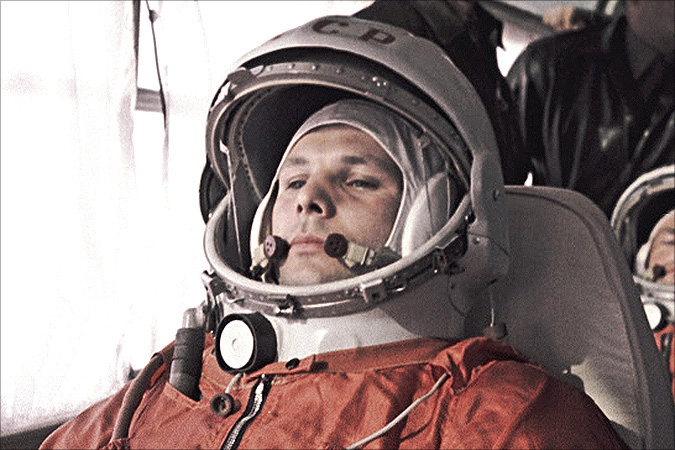Yuri Gagarin’s historic flight into space on April 12, 1961, marked a pivotal moment in human history. As the first person to travel into space and orbit the Earth, Gagarin’s achievement was not only a significant milestone in the Space Race between the United States and the Soviet Union but also an inspiration to people around the world. This monumental event reshaped the future of space exploration and cemented Gagarin’s legacy as a hero of the 20th century.
Early Life and Background
Yuri Alekseyevich Gagarin was born on March 9, 1934, in the village of Klushino, near Gzhatsk (now Gagarin), in the Smolensk Oblast of the Soviet Union. His family faced the challenges of World War II, with the Nazis occupying their village from 1941 to 1943. Despite these hardships, Gagarin excelled in his studies and was known for his interest in aviation.
Gagarin joined a local flying club in Saratov, where he quickly demonstrated his natural aptitude for flying. His passion for aviation led him to enroll in the Orenburg Military Flying School, where he graduated as a military pilot in 1957. Gagarin’s exceptional skills and potential caught the attention of the Soviet space program, and he was selected as one of the first group of cosmonauts in 1960.
Preparation for Space Flight
The Soviet space program was deeply involved in the Space Race with the United States, aiming to achieve groundbreaking milestones in space exploration. The selection and training process for the first human spaceflight was rigorous. Gagarin and his fellow cosmonauts underwent extensive physical and psychological training to prepare for the challenges of space travel.
Gagarin’s background, charisma, and impressive performance in training made him a standout candidate for the historic mission. He was eventually chosen to pilot the Vostok 1 spacecraft for the first manned spaceflight.
The Vostok 1 Mission
On April 12, 1961, at 9:07 a.m. Moscow Time, Yuri Gagarin’s Vostok 1 spacecraft launched from the Baikonur Cosmodrome in Kazakhstan. The flight marked the first time a human had ever ventured into space. The spacecraft reached orbit approximately 10 minutes after launch and completed one full orbit around the Earth in about 108 minutes.
During the flight, Gagarin remained calm and composed, despite the unprecedented nature of his journey. His voice was heard around the world as he transmitted his famous phrase, “Poyekhali!” (Let’s go!) at the beginning of the mission.
Impact and Legacy
Gagarin’s successful mission had a profound impact on the world. The event was a major victory for the Soviet Union in the Space Race and demonstrated their capabilities in space technology. It also inspired countless people around the world, showing that human space travel was not only possible but could become a new frontier for exploration.
Upon his return to Earth, Gagarin was hailed as a national hero and a global icon. His achievement sparked international interest in space exploration and paved the way for future missions. Gagarin’s flight encouraged the United States to accelerate its own space program, leading to the Apollo missions and the eventual moon landing in 1969.
Later Life and Tragic Death
After his historic flight, Gagarin continued to play an active role in the Soviet space program. He served as a prominent advocate for space exploration and worked on various projects within the Soviet space agency. However, he was no longer permitted to fly to space due to the high risks associated with his fame.
Tragically, Gagarin’s life was cut short on March 27, 1968, when he died in a plane crash during a training flight. His untimely death shocked the world and left a void in the hearts of many who admired him.
Honoring Gagarin’s Legacy
Yuri Gagarin’s contributions to space exploration have left a lasting impact on the world. His journey into space opened the door for future generations of astronauts and cosmonauts. In recognition of his achievements, numerous monuments, streets, and even an entire city (Gagarin) have been named after him.
April 12th is celebrated annually as International Day of Human Space Flight, commemorating Gagarin’s historic flight and promoting awareness of the importance of space exploration. His life story continues to inspire people worldwide, reminding them of the possibilities that lie beyond the stars.
In conclusion, Yuri Gagarin’s historic flight on April 12, 1961, remains a milestone in the annals of human achievement. His courage and pioneering spirit continue to serve as a beacon of inspiration, guiding humanity’s journey into the cosmos.






